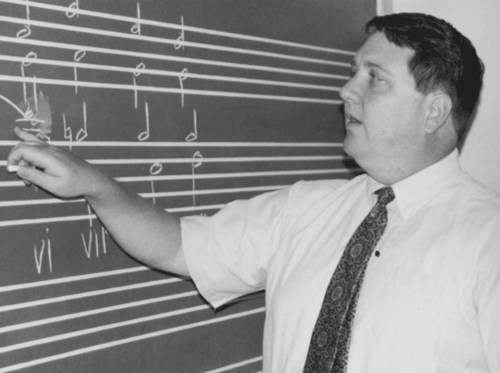Dr. Michael Linton
Professor

Departments / Programs
Degree Information
- PHD, New York University (1988)
- MA, Yale University (1980)
- MM, University of Cincinnati (1977)
- BM, Wheaton College (1974)
Areas of Expertise
Theory
Composition
Music History
J.S.Bach
Aesthetics
Biography
“Not to be missed” is how Opera News praised Michael Linton’s Franchetti Songs, a judgment repeated in the journal’s high praise of his earlier Carmina Catulli: “a cycle of seventeen songs that burst with bold originality. . music of an eclectic but coherent and distinctive style, contemporary but otherworldly. . . fearsomely challenging music, a personal and assertive reimagining of some timeless, emotionally and sexuall...
Read More »“Not to be missed” is how Opera News praised Michael Linton’s Franchetti Songs, a judgment repeated in the journal’s high praise of his earlier Carmina Catulli: “a cycle of seventeen songs that burst with bold originality. . music of an eclectic but coherent and distinctive style, contemporary but otherworldly. . . fearsomely challenging music, a personal and assertive reimagining of some timeless, emotionally and sexually charged poetry.” The French ForumOpera echoed that praise, calling Carmina Catulli “works of substance and feeling. . inspired”, giving the CD the Forum’s extremely rare four-star rating. And Opera News repeated its enthusiasm for Linton’s music in its review of his Wilde Songs, calling them “revelatory. . . heart breaking and beautiful” and ForumOpera, in its review of the Franchetti Songs, wrote "Linton siezed the texts with relish, treating them with his customary total freedom . . .making honey from the audacity of his predecessors and creating his own sound universe." (De cette matière, l’autre démiurge qu’est le compositeur Michael Linton s’empare avec délectation, pour la traiter avec la totale liberté dont il est coutumier. Il s’autorise tout et ne s’interdit rien, faisant son miel des audaces de ses prédécesseurs et créant ainsi son propre univers sonore. . )
Not only have critics in the US and Europe praised his music, Linton’s scholarship has found a similarly wide audience. In his 1999 “The Mozart Effect”, Linton was the first call into question the idea that exposure to Mozart’s music boosted intelligence, a position that eventually resulted in a German governmental study that discredited the Mozart effect’s claims (“Macht Mozart Schlau?”, 2006). His study of Johann Sebastian Bach’s “Magnificat” was one of the first studies to show a direct relationship between the composer’s reading of Luther and his specific compositional decisions and Linton’s study of the prelude with which the composer headed his second volume of the Well-Tempered Clavier showed the likelihood that revisions upon the prelude’s design testified to Bach’s intention of shaping the piece according to golden mean principles, something which had been suspected in some of Bach’s works but never demonstrated in the progression through a piece’s revisions. His work on governmental support of the arts has been cited in the Yale Law Review and his writings on Messiaen have been republished in Europe, the United Stated, and Australia. His writings have appeared in The Wall Street Journal, First Things, The Weekly Standard, and the journal BACH, and he served as music critic for the St. Paul Pioneer Press and The Connecticut Post.
Linton teaches undergraduate theory at MTSU and wrote the curriculum for School of Music’s two-year theory core. Before joining the MTSU faculty in 1994, Linton held faculty positions in conducting, theory, musicology, and composition at universities in Minnesota and Connecticut. In Connecticut Linton also also headed the Andre & Clara Mertens Contemporary Composers Festival—the country’s largest and most prestigious festival devoted to the work of a living American composer—and in Minnesota directed the Masters Orchestra, a professional chamber ensemble performing in the Twin Cities' northern suburbs. He received his undergraduate training at Wheaton College (Illinois) and graduate training at the University of Cincinnati (MM), Yale University (MAR), and New York University (PhD). He studied with Krzysztof Penderecki at Yale, Lukas Foss at Cincinnati and did his dissertation on George Rochberg at NYU. As a church musician, Linton has served Baptist, Congregational, and Episcopal congregations and is a founder and current president of the Rutherford Neighborhood Alliance, a non-partisan 501(c)(4) organization devoted to open records and lawful local government. He is co-founder of Refinersfire, LLC, a recording/production company and maintains the website www.refinersfirsmuc.com , and tweets at @refinersfiremu1


